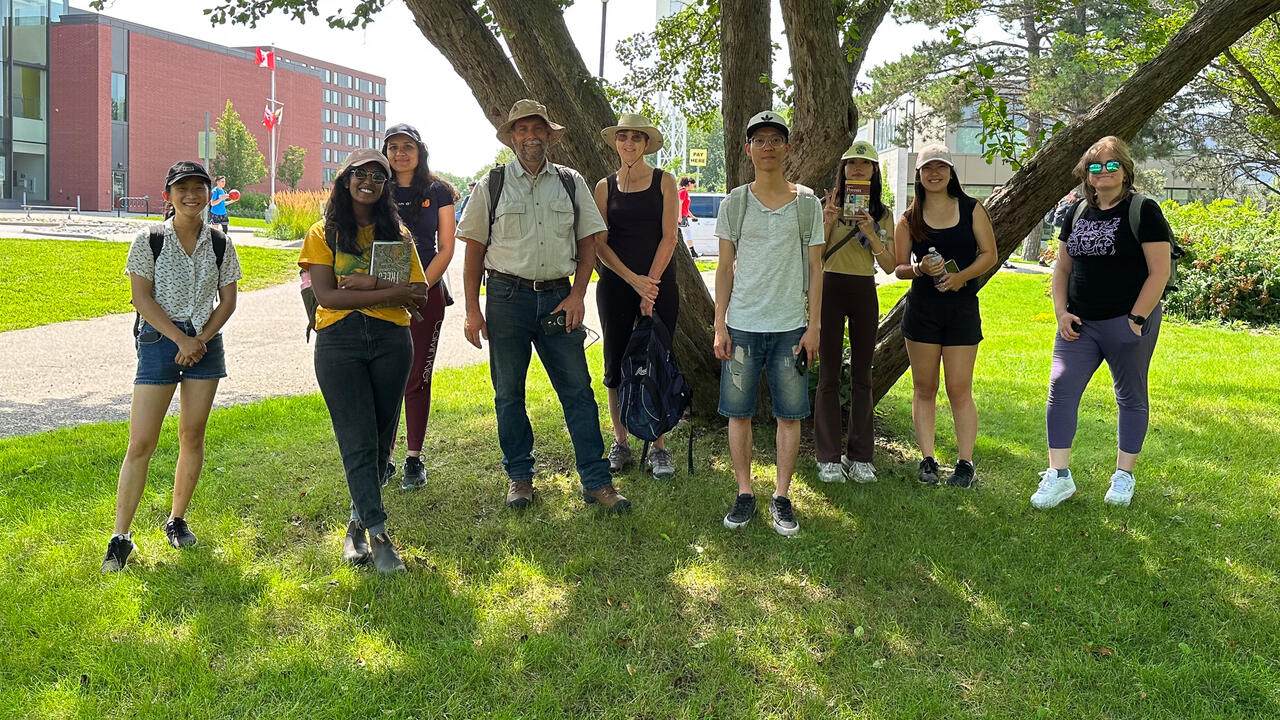
Protecting Waterloo’s biodiversity
The Sustainability Office hosts its first BioBlitz citizen science event

The Sustainability Office hosts its first BioBlitz citizen science event
By Angelica Marie Sanchez University RelationsThis past weekend, the University of Waterloo hosted its first BioBlitz, where more than 100 Waterloo community members participated as citizen scientists to record various plant and animal species across main campus. Waterloo students, staff, faculty and alumni experts led guided hike sessions and provided tips on how we can protect the University’s biodiversity.
After attending the first guided hike on plants, trees and butterflies, participants gathered in the Hagey Hall atrium for the opening ceremony led by Indigenous Knowledge Keeper, Elder Myeengun Henry, and Mat Thjissen, director of the Sustainability Office.
Elder Henry started the opening ceremony by acknowledging the fact that conducting a BioBlitz will require us to visit and respect the homes of trees, plants and animals across campus. He added that by identifying and recording all the different species, we are also identifying how we are going to be respectful towards these species, their land and how we take care of them.
“When we start to realize the importance [of different species], we have a whole different view of this land and how important it is for us to be more respectful,” said Elder Henry. “This is why we are all hoping that through these types of activities, you're going to be able to see what's been affected by the things that we do as human beings, and so we can make those changes to improve life for all of us on the planet.”
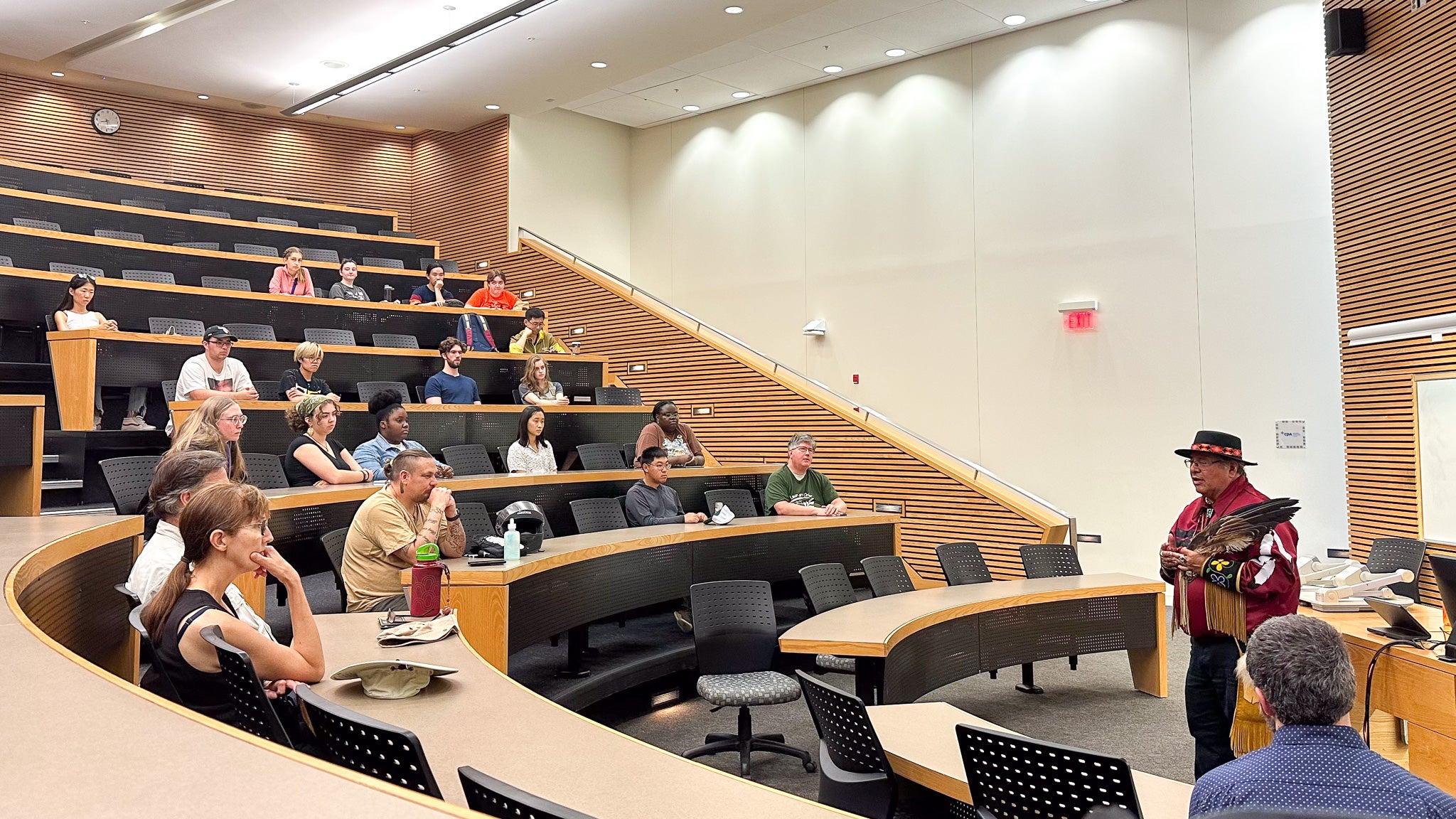
Elder Myeengun Henry leading the opening ceremony at the University of Waterloo's first BioBlitz.
In 2023, the QS World University Ranking recognized Waterloo as 36th in the world for their new ranking indicator on sustainability. Waterloo’s environmental and social impact is a direct result of our commitment to sustainability and is outlined in the University’s Environmental Sustainability Strategy.
As director of the Sustainability Office, Thjissen highlighted that Waterloo’s commitment to sustainability includes working, learning and connecting with the Indigenous community. Thjissen expanded on the land acknowledgement by reminding attendees that we are not the only occupants of this land.
“In our many shared objectives, Indigenous communities are often on the frontlines of environmental challenges that we face today,” said Thjissen. “They're also at the forefront of the solutions that we have to these crises, often bringing in the original stewards of the lands that we call home. And we have much to learn from traditional Indigenous knowledge and history for our collective sustainability.”
Elder Henry shared with the audience on how Indigenous communities would hold Vision Quests — a series of ceremonies where Indigenous people would fast for four days, while staying in the ancestral territories that are home to deer and other animals. Indigenous communities would hold Vision Quests as an opportunity to learn about the animal life that coexists around us.
The Sustainability Office aims to implement a similar ceremony through the BioBlitz event. Where we can identify and learn about the various plant and animal species that live on the land and with support from the Indigenous community, we can build on our knowledge and put together plans that will protect and restore some of the areas on campus.
The National Geographic Society was one of the first organizations to adopt the BioBlitz method by hosting events across different U.S. National Parks each year. Now, institutions and organizations across Canada are encouraged to host their own BioBlitz and use the iNaturalist app on their mobile phones to collect data and biological information of species.
iNaturalist has become an open-source database used by scientists and policymakers around the world to manage data on the Earth’s biodiversity. The University of Waterloo BioBlitz project can be viewed on the iNaturalist website, which provides an overview of all the observations and species recorded by Waterloo citizen scientists.

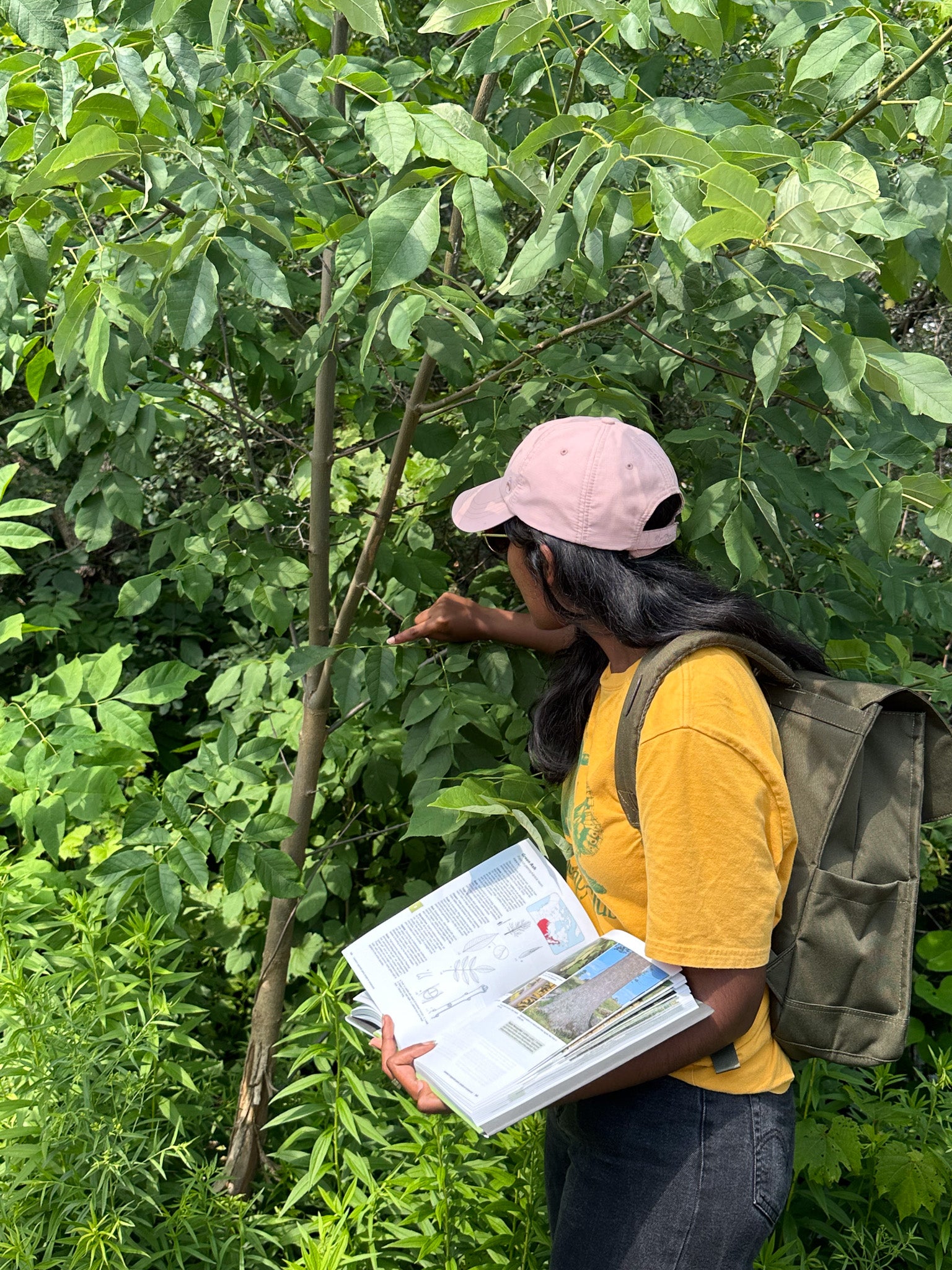
Hashveenah Manoharan (BES '21), Waterloo alum and biologist from Natural Resource Solutions Inc., leading a guided hike tour on main campus and explaining the unique nature of tree identification.
“Citizen science relies on everyone — whether they have lots of expertise or they're still learning about the environment — we want people to connect and learn about nature,” said Patricia Huynh, sustainability projects manager of the Sustainability Office. “But we also want people to contribute in a really meaningful way during our first BioBlitz, while we create this baseline of existing biodiversity on campus.”
The Sustainability Office offers a working draft copy of their Sustainable Land Care Standard document, which provides as a practical implementation guide on understanding what species are on campus. Understanding the different species that live on this land can help determine the ecosystem services that the University needs as we try to protect and restore Waterloo’s biodiversity.
Hosting annual BioBlitz events in the future will help further implement the University’s three reinforcing and interdependent goals: being a leader in sustainability education and research, to operate the campus more sustainably, and to embed sustainability practices into campus culture.
By protecting the Earth’s biodiversity, we are continuously working to build a more sustainable future so both humanity and the planet can thrive.
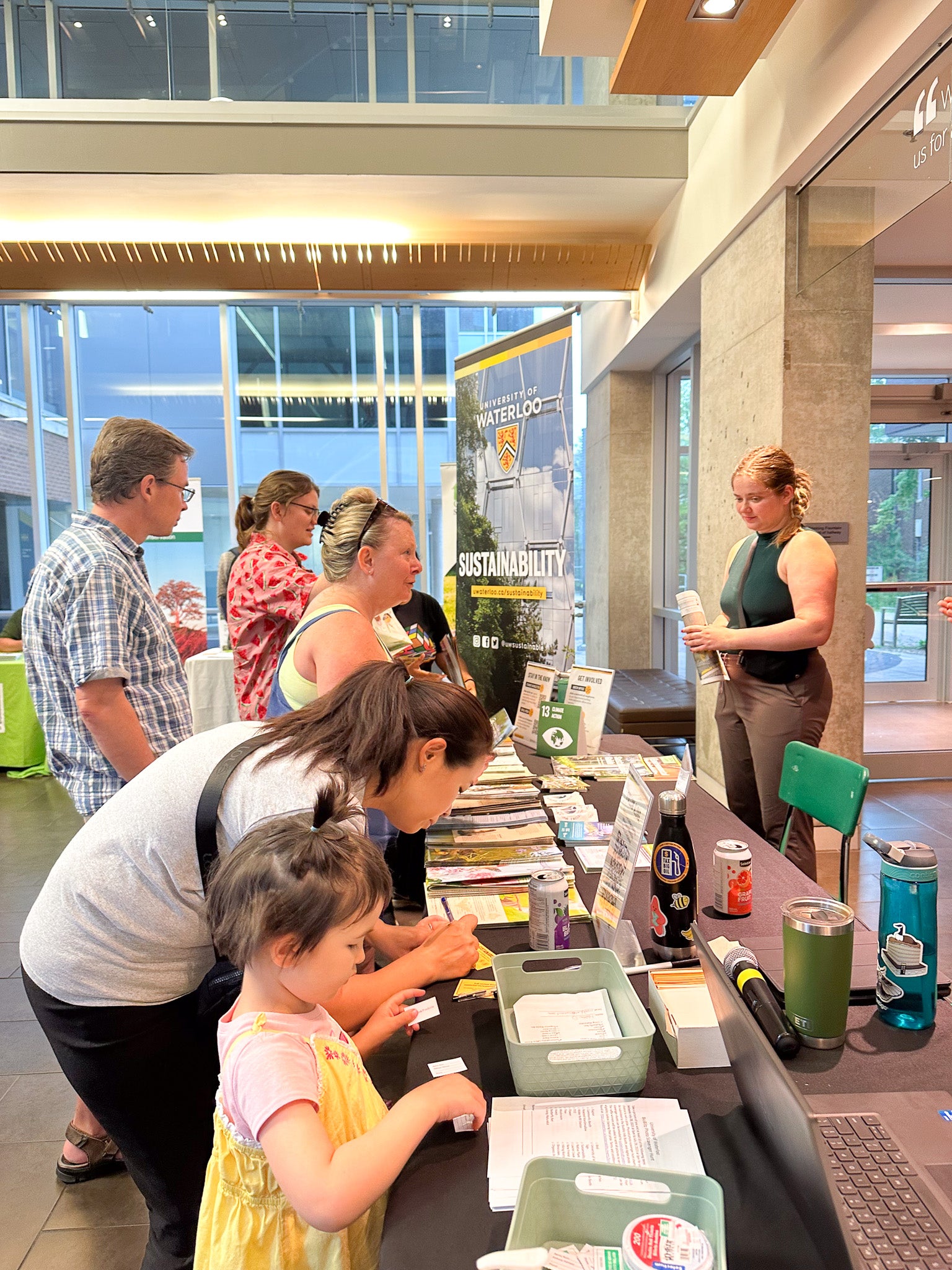
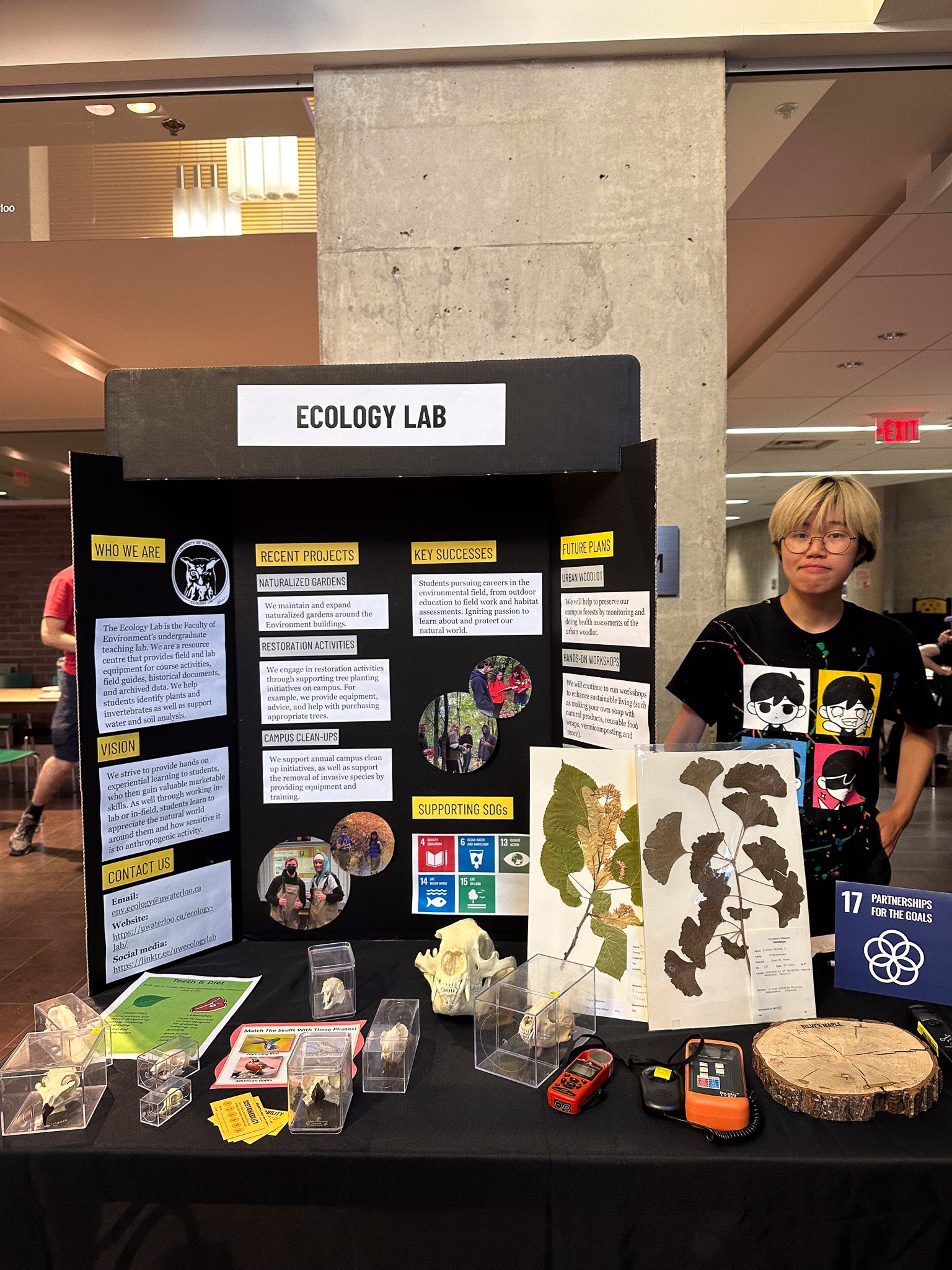
The Sustainability Office and the Ecology Lab welcome participants to learn more about their sustainability initiatives and projects on campus.
Participants also had the opportunity to visit community booths set up in the Hagey Hall Atrium, where the following organizations shared about the sustainable work they do around the Region of Waterloo: rare, Reep Green Solutions, City of Waterloo Pollinator Working Group, Waterloo Region Nature, Ecology Lab, and the Society for Ecological Restoration UW.
The BioBlitz event was funded by the Sustainability Action Fund: a fund that supports projects and initiatives that improve sustainability at Waterloo.

Read more
New QS World University Ranking measures environmental and social impact

Read more
Here are the people and events behind some of this year’s most compelling Waterloo stories

Read more
It Started in Waterloo: An Astronaut's Journey into the Universe of Innovation, narrated by Chris Hadfield, highlights the University of Waterloo’s role in igniting innovation within the region and beyond.
The University of Waterloo acknowledges that much of our work takes place on the traditional territory of the Neutral, Anishinaabeg, and Haudenosaunee peoples. Our main campus is situated on the Haldimand Tract, the land granted to the Six Nations that includes six miles on each side of the Grand River. Our active work toward reconciliation takes place across our campuses through research, learning, teaching, and community building, and is co-ordinated within the Office of Indigenous Relations.